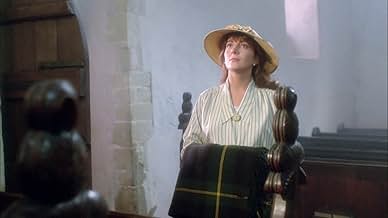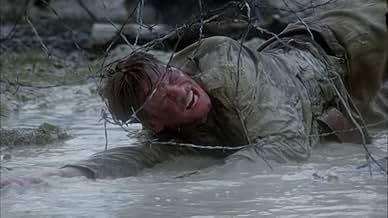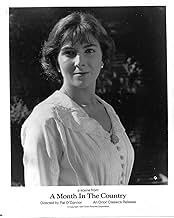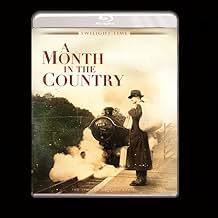PUNTUACIÓN EN IMDb
6,8/10
2,2 mil
TU PUNTUACIÓN
Dos soldados se recuperan de la Primera Guerra Mundial mientras pasan un verano en un pueblo de Yorkshire.Dos soldados se recuperan de la Primera Guerra Mundial mientras pasan un verano en un pueblo de Yorkshire.Dos soldados se recuperan de la Primera Guerra Mundial mientras pasan un verano en un pueblo de Yorkshire.
- Dirección
- Guión
- Reparto principal
- Premios
- 1 premio y 1 nominación en total
Ken Kitson
- Mr. Sykes
- (as Kenneth Kitson)
Reseñas destacadas
I think this is the most-watched movie in my collection. Its strong passions are beautifully understated by the entire ensemble, which is the thing that I appreciate most in this film. All the cast are excellent, including the children (and I must add a special appreciation for Jim Carter, who has played opposite Firth in at least two other films that I know of), but this is an absolute tour de force for both Colin Firth and Kenneth Branagh. The viewer seems to share the pain and humiliation borne by the sufferers of "shell shock". Their encounters with the joy and grief inherent in the life and people of a small Yorkshire village are both poignant and humorous.
The slow pace enriches the character development and story. It mirrors the patient process of both leading characters' pursuits: Firth's character uncovers a medieval church mural slowly and carefully, as Branagh's seeks and uncovers a mysterious grave. Both work with an audience of curious local villagers by day, and wrestle with their personal demons by night. Slowly new bittersweet relationships develop as the summer progresses. I pity the impatient of this world who can't focus their attention long enough to take in or appreciate the rich content of the performances, the subtle direction, the beauty of both the cinematography and the music.
This movie is a gentle and uplifting experience each time it is viewed! A movie to be savored. I highly recommend it!
The slow pace enriches the character development and story. It mirrors the patient process of both leading characters' pursuits: Firth's character uncovers a medieval church mural slowly and carefully, as Branagh's seeks and uncovers a mysterious grave. Both work with an audience of curious local villagers by day, and wrestle with their personal demons by night. Slowly new bittersweet relationships develop as the summer progresses. I pity the impatient of this world who can't focus their attention long enough to take in or appreciate the rich content of the performances, the subtle direction, the beauty of both the cinematography and the music.
This movie is a gentle and uplifting experience each time it is viewed! A movie to be savored. I highly recommend it!
When an arm or leg is removed, the amputee can continue to 'feel' it for some time afterwards. The phantom limb can hurt, or itch, or feel cold. But nothing is truly the same.
Similarly, the First World War irrevocably altered Britain, but in its immediate aftermath we limped on, unaware (or unwilling to admit) that anything had changed. It's this brief period of denial that Month in the Country illustrates: the moment when we teetered on the edge of the 19th century before toppling into the 20th.
Consequently, while it is a film of great heartbreak and loss, it is also one of great hope and triumph of the human spirit. There is one scene that perfectly illustrates this: a little girl visits her friend, who is sick in bed. She talks about the weather and her new hat and how they'll play together when her friend gets well. Then as she walks back home she says to Colin Firth
'She knows she's dying, doesn't she?'
It is as tragic for the girl to be so knowing and capable in the face of death as it is for young men to have experienced the hell of the trenches and return to indifference and hostility. But because of that tragedy they will go on to experience a more real, and potentially more joyful world, than the other inhabitants of comfortable and conventional Oxgodby.
Similarly, the First World War irrevocably altered Britain, but in its immediate aftermath we limped on, unaware (or unwilling to admit) that anything had changed. It's this brief period of denial that Month in the Country illustrates: the moment when we teetered on the edge of the 19th century before toppling into the 20th.
Consequently, while it is a film of great heartbreak and loss, it is also one of great hope and triumph of the human spirit. There is one scene that perfectly illustrates this: a little girl visits her friend, who is sick in bed. She talks about the weather and her new hat and how they'll play together when her friend gets well. Then as she walks back home she says to Colin Firth
'She knows she's dying, doesn't she?'
It is as tragic for the girl to be so knowing and capable in the face of death as it is for young men to have experienced the hell of the trenches and return to indifference and hostility. But because of that tragedy they will go on to experience a more real, and potentially more joyful world, than the other inhabitants of comfortable and conventional Oxgodby.
This pastoral English period piece must be one of the quietest anti-war movies ever made, with a single gunshot heard throughout the entire film (except for the brief battleground flashback before the opening credits), and fired only by a sportsman. But its effect is no less traumatic on the shell-shocked protagonist: a veteran of The Great War taking refuge, after the Armistice, in an isolated English village, far away (except in his nightmares) from the trenches. Hired by the local church to excavate a medieval mural above the alter, he uncovers, in no particular order: an age-old mystery; a bittersweet attraction to the vicar's young wife; a kinship with another ex-soldier (Kenneth Branagh, pre-'Henry V') and, finally, some of the dignity he lost in battle. Don't expect any grand gestures from the leisurely told story. Any positive response to the film will depend entirely on a tolerance for such anachronistic virtues as forbearance, charity, and forgiveness.
This is a true gem of a film. Only those however who have an empathy for the destruction of World War One, and a sensitivity about how moving religious themes can be, will really appreciate the aspects of the film which make it timeless. It is deliberately slow and careful in its pace, and the contrasts between Church and Chapel, working and upper class, and social mobility makes it a film I have always found very moving. The use of the Schubert Mass as a musical backdrop at key points emphasises the cathartic journey Birkin makes. Indeed, his visit to the church as an old man demonstrates the way he has been cleansed of the mud of Flanders.
It is a movie like a good book, you want to cozy down with on a long winters night....it said more than it showed and it showed more than it said..the parting of Birkin and Moon mostly, Birkin, had me watching it several times,,what were the questions and the answers?...it reminded me of "Waiting for the Moon" with Linda Hunt...thanks
¿Sabías que...?
- CuriosidadesFilm historian Nick Redman mentions in his commentary included in the BFI edition of the movie that, at the time of its original release, this was said to be a movie "starring two nobodies".
- PifiasAccording to Alice Keach, her roses are the variety Sarah Van Fleet. However, the film is set in 1920 and Sarah Van Fleet roses were not introduced until 1926.
- Citas
Reverend Keach: Mr. Birkin, you should know here and now that you employment here does not have my support. But as the solicitors refuse to pay out the £1,000 bequest to our fabric fund until your job is finished I have no choice.
Selecciones populares
Inicia sesión para calificar y añadir a tu lista para recibir recomendaciones personalizadas
- How long is A Month in the Country?Con tecnología de Alexa
Detalles
- Fecha de lanzamiento
- País de origen
- Idioma
- Títulos en diferentes países
- A Month in the Country
- Localizaciones del rodaje
- Empresas productoras
- Ver más compañías en los créditos en IMDbPro
Taquilla
- Recaudación en Estados Unidos y Canadá
- 443.524 US$
Contribuir a esta página
Sugerir un cambio o añadir el contenido que falta






























